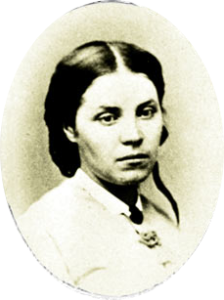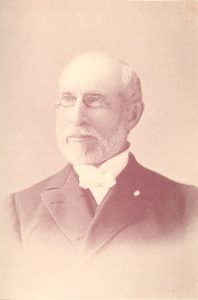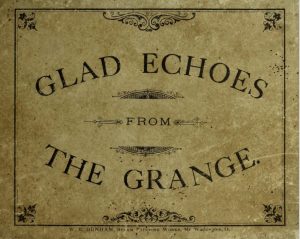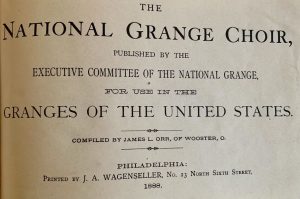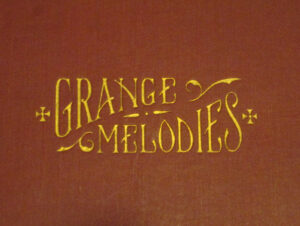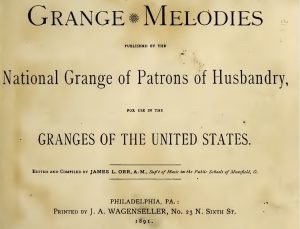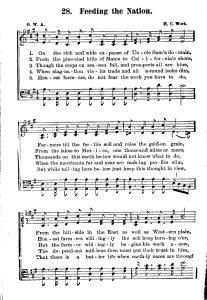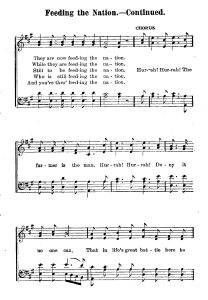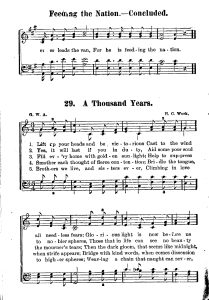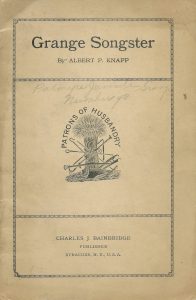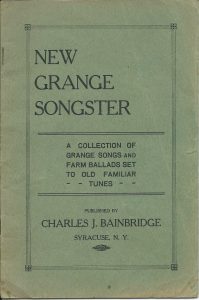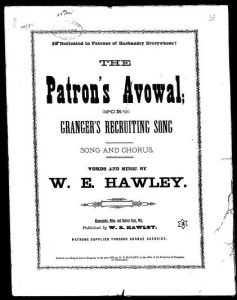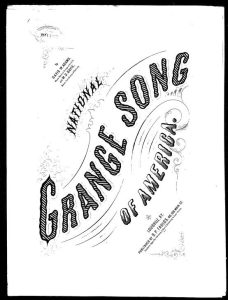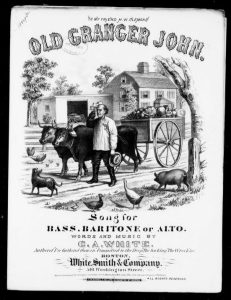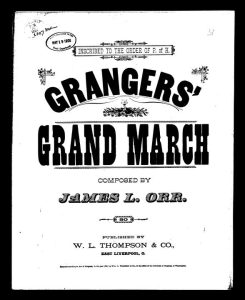This history of Grange songbooks and sheet music, both official and unofficial, is a work in progress. If you spot any errors or omissions, please be in touch! I’ve provided what links to digital copies I’ve been able to find, but did not find one in every case. If you’re looking for physical copies, Bookfinder.com is a helpful search tool for used books and reprints.
____________________________________________________________
The Grange has been a singing organization since its early days. Its official 1874 publication The Grange Illustrated: or the Patron’s Handbook tells us, “as every well-regulated Grange is supposed to have a musical instrument, either piano, cabinet organ, or melodeon, in its room, and usually a number of well-trained voices among its members, this part of the exercise passes off very pleasantly.” (Note the organ pictured above.) That handbook itself includes lyrics to a number of songs.
____________________________________________________________
The first Grange songbook, Songs for the Grange, went through several revisions. The editions I’ve found, all from 1874, don’t credit a compiler, but, according to The Grange Illustrated; or The Patron’s Handbook (1874), “The compilation of the Grange Songs and the accompanying Melodies, was the work of Miss Carrie A. Hall, the present Lady Assistant Steward of the National Grange.” Caroline Arabella Hall was the niece and assistant of Grange founder Oliver Hudson Kelly. Her advocacy was key to women’s inclusion in the organization on an equal footing with men.
Ms. Hall deposited a 36-page version of Songs for the Grange in the Library of Congress in 1872. This is likely the version whose 1872 printing, sales, and shipping to Subordinate Granges are reported in the 1873 Proceedings of the Sixth Session of the National Grange of the Patrons of Husbandry. She registered a 70-page version with the Library of Congress in 1873. The Library of Congress copies have not been digitized. I’d love to find copies of these earliest Grange songbooks!

An 1874 meeting report included in the 1875 Proceedings describes what happened next:
“The supplies furnished to Granges include a certain number of song-books. In the earlier days of the Order, want of song-books was, for some time, a serious detriment, and as at that period the National Grange had no funds to use for this purpose, the void was filled by Sister Hall, who selected and arranged a sufficient number for the purpose. This arrangement was copyrighted by the compiler, who for several year supplied the wants of the Grange.
“As the demand increased it became a necessity that the Grange should procure these books at first cost, and the alternative was presented of purchasing the copyright of Sister Hall or issuing a new work. This latter proposition was submitted to Brother [Aaron B.] Grosh, who undertook the labor of revising, rearranging, and adding new matter where necessary; but the question still remained as to the use of certain songs in the collection copyrighted by Sister Hall.
“Your Executive Commitee, after a careful study of the whole matter, concluded, as a matter of economy on the one hand and justice on the other, to pay Sister Hall $1,000 if she would relinquish all claim to the song-books. This proposition having been agreed to, the song-books have since been the property of the National Grange.
“It may be stated that Brother Grosh has completed his edition, and that it is now ready for publication whenever the Grange may so order.”
Later in the 1875 Proceedings, we read: “Your [Executive] Committee have not had an opportunity of examining the new edition of the song book and therefore recommend for the present year those now in use. Adopted.” The 1874 account of printing and binding costs reports 196,081 songbooks produced for $10,033.76. It’s not clear how many of these, if any, were the new edition. In any case, when it was finally released the work bore the date of its completion, 1874.
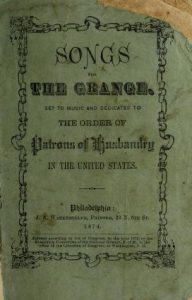
An 1874 version with words and music, shown above, is downloadable from the Internet Archive and the HathiTrust Digital Library. This must be Grosh’s revision as it is longer than the 70-page edition copyrighted by Caroline Hall. A words-only 1874 version is available for free download from Google Books.
The 1877 Proceedings report the presentation of “papers in relation to a claim of Bro. A.B. Grosh, for services in preparing the Ritual and Song-book, which were referred […] to the Committee on Claims and Grievances.” The 1878 Proceedings recount the Committee’s substantial report and recommendations. The matter was resolved by paying Brother Grosh $100 for stamps and stationery costs plus interest and $100 for composing “as many as ten songs which were to have been inserted in the text of the Revised Ritual, but which were never so used, but were inserted in the Song Book.”

A slightly different words-only version was issued by the Dominion Grange in London, Ontario in 1874. It is available for download from the Internet Archive and Canadiana. The earliest history of this Canadian version is unclear. The 1874 Proceedings of the First Session of the Dominion Grange of the Patrons of Husbandry records a committee on songs and ritual and the printing of “1,000 song cards“, and reports that they “did not consider it advisable to make any alterations at present.”
In the 1875 Proceedings, the Committee on Ritual reported, “With regard to the Song Books, we find contained in them some songs that are not strictly suitable to our wants, being prepared for the use of Granges in the U.S., but as they can be purchased cheaper than anything suitable could be prepared, and there are may excellent songs contained in them, we thnk it is advisable to continue their use for the present, and as the pleasing effects of singing are acknolwedged by all, we recommend Granges to supply themselves with books and use them frequently in their meetings.”
____________________________________________________________
The Trumpet of Reform: A Collection of Songs, Hymn, Chants and Set Pieces for the Grange, the Club, and all Industrial & Reform Organizations was published in 1874, not by the Grange, but jointly by John Church & Co. of Cincinnati and Geo. F. Root & Sons of Chicago. It was edited by composer and songwriter George Frederick Root (of “Battle Cry of Freedom” fame), “[a]ssisted in the preparation of the words by Mrs. S. M. Smith”. She contributed the lyrics to nine songs in this volume. One of them, “Hear! Hear the Shout!“, with music by Root, was issued in sheet music form the year before.

The Smiths were a farming family in Kewanee, Wethersfield Township, Henry County, IL. Mr. Smith was a member of Kewanee Grange No. 70, the Secretary of the State Farmer’s Association of Illinois (which he helped found), an anti-monoply organizer, and a supporter of the Independent (Greenback) Party. Mrs. Smith, whose first name was Elizabeth, according to the 1860 and 1870 censuses, was appreciated for “the services rendered the Farmers’ Movement by her poetry and writings for the press”. Chicago’s Workingman’s Advocate newspaper, upon engaging her as “editress” of a women’s column, described her as “a graceful and elegant writer, whose sympathies and pen have long been enlisted in advocacy of labor’s rights”.
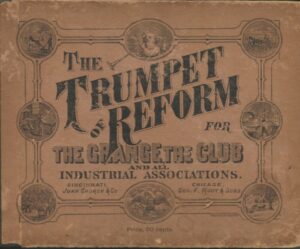
Mrs. Smith and Mr. Root said in their preface, “This volume has been prepared, at the urgent request of many members of Farmers’ organizations, to supply a long-felt want for a larger and more varied collection of songs than the one now in use in the Grange. While this is not intended to supersede or take the place of that one in the ceremonial work of the Order, it is designed for general use in both Grange and Club.
“A large portion of both the words and music has been prepared especially for Mass-meetings, Picnics, Sociables, and Celebrations, and is also well adapted to the meetings of other Industrial and Reform organizations, while many pieces in it will be found appropriate for the entertainment of the family circle.
“From the fact that all true Reforms have agreeing and connecting motives, many appropriate songs will answer well for quite different occasions.”
The songbook may be downloaded from the Internet Archive, HathiTrust, or York University Digital Library.
____________________________________________________________
In 1876 the Ohio State Grange registered the Patron’s Song Book: for use in the Grange with the Library of Congress and had it printed in Cincinnati. Unfortunately it has not been digitized. I am seeking a copy.
____________________________________________________________
By 1880, the time was clearly ripe for a new National Grange songbook. That year’s Journal of Proceedings provides the National Secretary’s report that “The supply of Song Books now on hand is reduced to about 150 copies; a new supply, either of the same book or of some other, should be provided at once.” The National Executive Committee reported that “Your Committee have deferred the publication of a new edition, believing there are in existence, and can be procured at reasonable cost, many songs preferable to some of those in the present song book. They would therefore ask instructions upon the matter of revising or re-publishing the present song book.”
A decision was taken “to revise and have published an edition sufficiently large to supply the probably demand for them.” The Executive Committee asked for “aid from every attainable source, and time to collate, arrange and print such edition. To expedite their effort, your committee fraternally requests members of this body, and Patrons elsewhere, to send to them […] any selected stanzas of verse, any approved airs or sheets of music, or any song book that may have been approved by any State Grange, that they may have compiled an enlarged Song Book, adapted to the wants of our Order all over the Union.”
____________________________________________________________
Once again Ohio already had the matter well in hand. Their 1880 state Grange Proceedings noted as “Resolved, That the Executive Committee be requested to examine the new Grange Song Book that has been prepared by Bro. J. L. Orr, of Wayne County, and, if found suitable, to make satisfactory arrangements with him and publish at an early day an edition of the book and furnish it to the subordinate Granges at the lowest price that will secure the State Grange from loss.”
Glad Echoes from the Grange, edited by James L. Orr, was published in 1881 by the Ohio State Grange. It is available for download at the Internet Archive and the HathiTrust Digital Library.
The 1881 Proceedings of the Ohio State Grange record sales of 5800 copies and report that “The new life and interest that had been infused into our Granges through the introduction and use of the Patrons Song Book a few years ago and a demand for a revision of this book, caused the committee to look forward to the publication of a new book. Bro. J. L. Orr, of Apple Creek Grange, was conferred with and the result was that a contract was entered into with him to assist in getting out a new Song Book, resulting in the issuing of the book entitled “Glad Echoes from the Grange.” For this book we have secured many choice pieces of music, and the demand for it has been so great that six thousand copies have been printed and the present edition is now about exhausted . We would recommend that a new and enlarged edition of this song book be ordered by this Grange.”
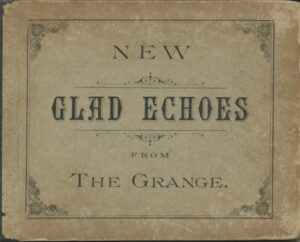
Later in 1881, the Ohio State Grange published James L. Orr’s New Glad Echoes from the Grange, with 44 more songs. It would be sold by the Ohio State Grange for decades, but by 1915, it was “discontinued, because the supply in stock was all sold, and in discussing the matter with the Executive Committee, we did not think it advisable to have a new edition published. The Grange Melodies are so much better books and they may be purchased from the National Grange at any time.” But that gets ahead of the unfolding story…
____________________________________________________________
Returning to 1881, according to the Journal of Proceedings of the National Grange, at the annual convention the Ohio delegation reported that “the new Song Book of the Ohio State Grange [and other initiatives] have all contributed towards firmly establishing the Order in the State of Ohio.”
Also in 1881, the National Executive Commitee reported it had been “impossible” to complete their task of producing a new songbook: “A correspondence of considerable magnitude was held with the musical talent of our Order in all sections of the land, but the suggestions received were so varied, the recommendations so diverse, and the committee themselves were so separated, that it was impossible for them to obey instructions. A revised song book, however, is an absolute necessity, and your Executive Committee would recommend that a committee be appointed at this session to select such songs as should be rejected from our present book; that the Executive Committee be allowed to negotiate for the purchase of the copy-right of the song book adopted by the Ohio State Grange, and then unite the two in one volume, and issue them to Granges at a small percentage upon the cost of publication.” Brother Orr’s work in Ohio had obviously made quite an impression!
The 1882 Proceedings report that “the Executive Committee entered into a contract with Mr. James L. Orr, of Wooster, Ohio, to compile a Song Book of one hundred and twenty-eight pages, including forty songs selected from the old Song Book of the Order, the conditions of the contract being, that the work should be approved by the Executive Committee, the electrotype plates to be the property of the National Grange; and upon the completion of the work, the Executive Committee were to pay to Mr. Orr the sum of three hundred and forty-nine dollars, and a further sum of three hundred dollars on the first day of December next. The contract thus far has been complied with by both the contracting parties, and an edition of ten thousand copies has been printed, specimens of which are now ready for inspection by the National Grange.”
That new songbook was The National Grange Choir. Copyrighted in 1882, it appears for sale on the last page of the Proceedings. (The images here are of the 1888 edition.)
Not everyone was content. The 1883 Proceedings report that “Your Committee on Good of the Order, to which was referred a resolution offered by Bro. Rose [of Texas], in relation to printing an edition of the Grange Song Book, with patent or shaped notes, has had the subject under consideration, and has made some inquiry in regard to the cost and demand of this kind of notes. As we are informed, they are only in use to a limited extent. We are also informed that this change in the form of ihe notes would be attended with a good deal of expense in printing, and while your Committee would be glad to extend all the facilities practicable to all desiring to use the Song Book, yet I am instructed to report the resolution back, with a recommendation that it do not pass.”
The Committee later withdrew that cautious advice, and it was decided “[t]hat the Executive Committee be, and are hereby instructed to procure the publication of the Grange Song Book, with shaped or patent notes, provided that it can be done at an expense not exceeding three cents per copy in excess of the cost of the ordinary edition.”

It seems those desired numbers did not add up, as the question of a shape note edition lay unresolved for a few years. The 1885 Proceedings recount the Executive Committee’s report that “More than once [1882 and 1885] the State of Texas, through its Master, has appealed to [us] to print and publish our song book in ‘character or shaped notes.’ This is a matter over which the Executive Commitee do not feel they have the jurisdiction, and hence submit it to the National grange for their action in the premises.” Later the matter was “referred to the Commitee on ‘Good of the Order.'”
Significantly, it was decided “[t]hat the State Grange of Texas be permitted to publish the Grange Song Book in shaped notes if they so desire.” A search of the available annual minutes of the Texas Co-operative Association, Patrons of Husbandry from 1886 through 1898 (1896 is missing) shows no record that they did so.
____________________________________________________________
The Alliance Songster: A Collection of Labor and Comic Songs for the Use of Grange, Alliance, or Debating Clubs was compiled and published in 1890, not by the Grange, but by Populist Party advocate (and later party chair) Leopold Vincent of Winfield, Kansas. The “Alliance” reference is to the Farmers’ Alliance, an organization which, like the Grange, arose in the 1800s to improve the lot of farmers and became a significant political force. This lyrics-only songbook has a strongly activist tone. It is downloadable from the Kansas Historical Society.
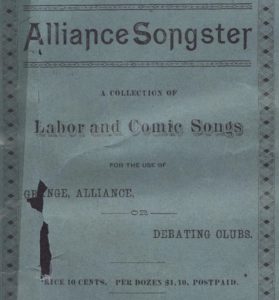
____________________________________________________________
As reported in the 1891 Proceedings of the National Grange, “It was evident to the [Executive] Committee that the Order required a New Song Book, with more popular songs, and a higher grade of music, to keep pace with its progressive work. A contract was made with Professor James L. Orr, of Mansfield, Ohio, to edit the work under the supervision of the Committee. The work was commenced in April and completed ready for the press, in August. 5500 copies of the work have been published, and the “Grange Melodies,” with its 200 pages of choice songs and music is now before the Order. It is to be hoped that this act will meet the approval of the National Grange, and that the new song; book will fill a long felt want in Grange work.”
Grange Melodies is available for free download from the Internet Archive and Google Books, as well as the HathiTrust Digital Library. It was reprinted in 1904, 1905, 1915, and 1920. An edition with a red cover is shown here, but it also came with a black cover.
____________________________________________________________
Although Grange Melodies had a very long run as the Grange’s primary songbook, a desire for new songs intermittently emerges in the record. The 1897 Proceedings relate the report of the Commitee on Good of the Order, who shared the request of Cadmus Grange, Kansas for “the getting up of a new Grange song book”, “but upon investigation we find that a song book was published about five years ago, a large stock still on hand, and we believe it not advisable to publish a new one at this time.”
The 1906 Proceedings relate the report of the Committee on Good of the Order, who addressed this proposal from Brother Fuller of New York: “WHEREAS, The official songbook of the Grange […] has been in use for many years and WHEREAS, The subordinate and Pomona Granges derive much asssitance from the music during Grange meetings, be it therefore Resolved, that the National Grange hereby appoint a standing committee to to revise the ‘Grange Melodies,’ or to provide a new book of music for use in the Grange.”
The Committee’s recommendation, which was accepted: “Realizing Granges in many, if not all the states have in late years been adding to their number of song books, which have a variety of selection, your committee deem it not advisable to add to the necessary expenses of the subordinate Grange and lessen uniformity, we therefore report adversely.”
____________________________________________________________
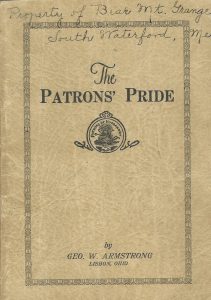
One book to satisfy the thirst for new material was The Patrons’ Pride by George W. Armstrong. It is downloadable a page at a time from HathiTrust.
It was apparently self-published in 1908 in Lisbon, Ohio, but it achieved wide distribution. According to the 1908 Journal of Proceedings of the National Grange, this “excellent little songbook” was “kindly furnished for the use of this session” and “recommend[ed …] for use in subordinate Granges in need of such a book.”
An article on p. 201 of the September 12, 1908 edition of The Ohio Farmer said, ‘BOOKFUL OF GOOD RURAL SONGS. The Patrons Pride. A new song book by George W . Armstrong. Contains songs for the Grange, farmers institutes, picnics and all social occasions in the country. There are songs for the different Grange degrees; opening, closing, dedication and songs for all occasions and moods in the Grange. There are stirring inspiring lyrics, fitted to familiar airs, that make you glad that you are a farrmer. Among them are several that have become popular thru their first publication in the Ohio Farmer. In particular, we are glad to find in the collection our old favorite, “Feeding the Nation”. The booklet contains 54 of these melodies, and is bound in paper with leather back. Price, 20 cents each; two copies for 35 cents; one dozen for $ 1.75; and $ 14 per 50 or 100. Many people write us for songs to use for farmers’ picnics , etc. Here is your chance to get all that you will need of good ones.’
I’ve found several newspaper references beyond Ohio, including a 1913 notice of a county Grange meeting in Monson, Maine, urging “Members having Patrons’ Pride song books, please bring them.” In 1915, a South Dakota paper said it “has had a wide circulation and [the] songs are sung in every state.” In Delaware in 1916, it seems to have been the default songbook of Coolspring Grange No. 44.
The 1914, 1919, and 1921 Proceedings of the Michigan State Grange includes it among their offerings of Grange supplies.
____________________________________________________________
Other independently published songbooks were the Grange Songster (words and music, 1915) and New Grange Songster: A Collection of Grange Songs and Farm Ballads Set to Old Familiar Tunes (words only, undated). Both were by Albert P. Knapp, who wrote almost all the lyrics. Both were published by Charles J. Bainbridge of Syracuse, NY, who also dealt in badges and supplies for Granges and other organizations. (His 1905 catalog has a listing for Grange Melodies at “40 cents each, post paid”.)
Apparently that connection helped secure a wide distrbution. For example, the Grange Songster appeared in price lists of Grange supplies and literature in the Journals of Proceedings of the Washington State Grange starting in the 1916 and running at least until 1927. Similar listings appear in the 1919 and 1921 Proceedings of the Michigan State Grange. I haven’t found download sites for these songbooks; the song title links lead to my own scans.
____________________________________________________________
As Ohio had demonstrated so successfully in 1881 with Glad Echoes from the Grange and New Glad Echoes from the Grange, state Granges had the option to publish their own materials as well. Here are a few examples. I’ll share any more I may find as my study of state Grange Proceedings unfolds.
____________________________________________________________
One was the project described in the 1924 Proceedings of the Washington State Grange: “It was decided to have printed five hundred copies of a song book which will contain a dozen of the Grange Melody songs with music and a few others with words only.” The State Grange Song Book makes its appearance in the “Price List of Grange Supplies and Literature” at $.05 per copy. I am seeking a copy.
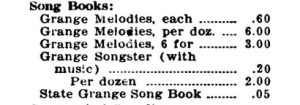
____________________________________________________________
The Grange supplies list in the 1914 Proceedings of the Michigan State Grange offered copies of “Song ‘A Michigan Home for Me'” and an “Ode Song Card”. (I am seeking copies.) The 1919 Proceedings of the Michigan State Grange published a similar list continuing to offer the Ode song card but adding the “Michigan Grange Song Collection (new)”. (The Patrons’ Pride, Grange Songster, and Grange Melodies were also listed.)
The 1919 edition is available at HathiTrust. Access to the 1935 third edition is available through the Internet Archive and a very limited search of it is available at HathiTrust. A fifth edition was published in 1940; a very limited search of it is also available at HathiTrust.
These editions were compiled by Dora H. Stockman. In addition to her many other accomplishments, she was the first woman elected to a statewide office in Michigan, where she served on the Board of Agriculture and later as a state legislator. She cooperated in musical matters with Granges beyond her home state; in 1919, she is reported as being paid by the State Grange of Pennsylvania for “song cards for State meeting”.
____________________________________________________________
Another Grange music project was undertaken by Mrs. Louie [Louise] Taylor Rodgers of Pennsylvania. According to a brief biography published in the 1927 Proceedings of the PA State Grange after her death, she trained at the New England Conservatory of Music and was an accomplished violinist. She and two of her daughters performed at the 1923 National Grange convention.
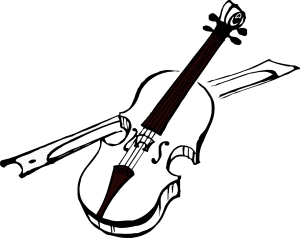
Let’s start by looking at her songbook work as reported on the state level.
In the 1919 Proceedings of the PA State Grange she reported: “In all ages, in all countries, in war and in peace, when men and women have been greatly stirred they have expressed it in song. The mother croons in a lullaby to her baby, the organ peals a joyous melody at the wedding, and the choir chants solemnly at the funeral of our dead. During the last years of the late war this nation sang as never before in its history. We came to know that singing together strengthened us, and many times we would nearly have failed in our hours of trial, had it not been for the messages breathed to us through the medium of song. The war is over, but we are passing through days of strain and stress which are to be a test of our national unity. As much now, and perhaps more than in the days of actual warfare do we need the strengthening and uplifting effect of music. Realizing this, and the desire for better music in our Grange life, it has been my privilege to compile the song book which you are using. If it is found to be worthy of use, it is my hope to add to it music adaptable to all our ritualistic work wherever advisable, that the beauty of harmony may add to the dignity already expressed in the written word.” (I am seeking a copy of this apparently early version of her later work.)
In the 1922 Proceedings of the PA State Grange, Mrs. Rodgers reported that “The preparation of a song book has been a part of my work during the year. This book will be entitled ‘The Patron’ and will be adapted to Grange and community singing. Delay in securing some of the copyrights prevented its publication in season for this meeting, but as soon as it is ready it will be advertised in ‘Grange News’ [published by the PA State Grange].”
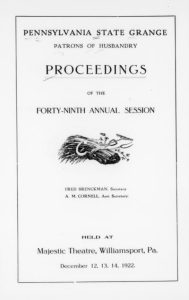
Also in 1922, Pennsylvania’s Committee on Pomona Granges recommended “that the book being prepared by Sister Ro[d]gers be adopted by the Pomona [G]ranges as their regular song book, for if this book can create in the Pomona meetings a fraction of the life and interest that Sister Ro[d]gers’ work has done in our state meetings it will more than repay any outlay of expense in securing them.”
The November 1924 Proceedings of the National Grange note that Mrs. Rodgers “appeared in regard to a song-book asking to use certain copyrighted songs in the Grange Melodies”, which permission was granted “in any edition of a song-book which she may publish in 1924.” That sounds like an appropriate step in compiling a state songbook.
However, there were indications that the project had also excited national interest. In the December 1924 Proceedings of the PA Grange she reported “At the invitation of National Master L. J. Taber, I met with the Executive Committee of the National Grange at Atlantic City in November to confer with the committee as to the completion of the new Grange song book. To this has been given my best efforts, and we had hoped to have the book ready for use at this State meeting. We expect that the book will be ready for use in March.”
In the 1925 Proceedings of the Pennsylvania State Grange, Mrs. Rodgers reported that “In my report of last year mention was made of the plans being matured for a new song book. As you know the book, which is named ‘The Patron’, is now the official song book of the National Grange, and I wish to express my feeling of appreciation in having been permitted to perform this service for the Grange.”

What had been going on at the national level during the years that Mrs. Rodgers was working in Pennsylvania?
The 1923 Proceedings of the National Grange report that Brother Caton of Ohio offered a resolution “on New Song Book, which was referred to the Executive Committee.”
In 1924, the Committee on Good of the Order recommended to the Executive Committee Brother Caton’s proposal “for the establishment of Grange Music House as proposed, the Grange assuming no responsibility therefor other than this endorsement and make it a depository for and source of distribution of the new song book when published, and that a Committee with power to act, be appointed to confer with Brother Orr at an early date, examine the materials offered for the new song book, approve and accept them or alter and substitute what they consider better adapted to the needs and uses of the Order and arrange with Brother Orr for the completion and publication of the new song collection as soon as is consistent with the best results, and that they and we lend all possible moral support and encouragement to the proposed plan for a wider development of music and musical opportunities for the Grange.”
However, the 1925 Proceedings report a 1924 Executive Committee directive “That the Secretary inform Mr. James L. Orr, the author of Grange Melodies, that while the Executive Committee recognize his invaluable services to the Order, they feel they cannot accept his proposition submitted in regard to publishing a new song-book, or the establishment of a new Grange music house.” We have no details of Mr. Orr’s rejected proposal, but this seems a very significant break with the man who had compiled two major Grange songbooks, the first forty-two years earlier in 1882, and who had been fully expected to produce another.
The account of another Executive Committee meeting says: “The matter of a new National Grange song-book was discussed at some length and it was Voted: To appropriate a sum not to exceed five hundred dollars ($500) to pay for rearrangement and compilation of a new song-book. Voted: That the matter of contract and publishing of the new song-book be left in the hands of the Secretary of the Executive Committee”, Leslie R. Smith.
Apparently Secretary Smith found a way forward in collaboration with Mrs. Louie Taylor Rodgers, presumably connected with her conversation with Master Taber. In his address to the 1925 convention, the National Master reported “a new Grange song book known as ‘The Patron’ has been prepared. A large edition has been printed and distributed. This book was arranged in a shape that additional songs can be added as occasion may require. It was thought not to try to include new or untried songs (although some valuable copyright music is included) but to try to utilize songs that have proved their worth by living through the years. It is hoped that this song-book will be of value to the Fraternity and render as large service as Grange Melodies has done in the past.”
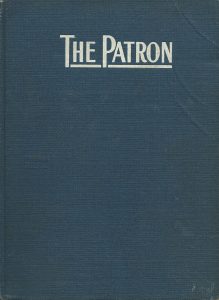 Mrs. Rodgers is mentioned by name in the 1925 Proceedings only as the recipient of a payment of $450 for unnamed services. It is not clear but seems plausible that it was for her work on The Patron.
Mrs. Rodgers is mentioned by name in the 1925 Proceedings only as the recipient of a payment of $450 for unnamed services. It is not clear but seems plausible that it was for her work on The Patron.
The preface to the songbook says “Credit is given to Mr. James L. Orr for a number of songs in ‘Grange Melodies‘ which we have retained, and the Executive Committee wish to take this opportunity to thank Mrs. Louie Taylor Rodgers and all others for suggestions and assistance.” Perhaps that was considered a diplomatic way to smooth over the breach with James L. Orr. Other sources, like the September 1925 issue of the Pennsylvania Grange News were more explicit in crediting Mrs. Rodgers as the compiler of the new volume.
The Patron: The Official Song-Book of the Grange served as the primary Grange songbook for a number of years. A revised edition was deposited in the Library of Congress in 1954.
____________________________________________________________
The Patron covered the needs of adult Grangers, but what about their children? In 1923, this recommendation of the Committee on Juvenile Granges was adopted: “That the Juvenile Superintendant make an effort to secure a song book for the use of the Juvenile Granges for the coming year.”
It seems that went nowhere. The call for such a book was repeated in 1925. The 1926 report of the National Juvenile Superintendant says that “sometime, when finances will permit, a Juvenile Song Book would be a great addition.” Also, the Committee on Juvenile Granges reported “We believe the National Grange should […] make arrangements for the compiling of Juvenile Songs and the preparation of a Juvenile Song Book.” In 1927 the National Juvenile Superintendant noted “a growing need for a Juvenile Song Book.”
I’ve been unable to find online copies of the National Grange Journals of Proceedings after 1927, so the trail goes cold there. The 1935 copy of the National Grange’s Juvenile Grange Song Book in my collection is proof that action was eventually taken.

____________________________________________________________
Due to the lack of post-1927 historical National Proceedings online, my history of vintage Grange songbooks ends there for now. (For contemporary songbooks visit the Grange Supply Store.) I will continue my research and add to this page as I learn more. Songbooks do not tell the whole story, though, as there was also sheet music! Most of these works are instrumentals rather than songs. Rather than inserting them into the songbook narrative, I’ve listed them here, along with download links to the Library of Congress.

The 1873 National Grange Quickstep by A. Sickle (real name or a play on words?), “Dedicated to Miss Carrie A. Hall“, is the only sheet music I’ve found officially “Published for the Order of the Patrons of Husbandry”, so I’ll mention it first. It was entered into the Library of Congress by O.H. Kelley, presumably Oliver Hudson Kelley, the founder of the Grange. No composer, publisher, or printer is named.
Also in 1873, Grangers’ Waltz by H. D. Sofge, “Heartily Dedicated to the ‘Grangers’ of the West” was published by John Church & Co., Cincinnati, OH, the same firm that worked with Geo. F. Root & Sons to release The Trumpet of Reform. H. D. Sofge also composed other works.
Another 1873 release, Song of the Grangers, with words by F. H. Carberry and music by William G. Farrar, “Dedicated to the Grangers of America”, was published by William. G. Farrar and Co., Dubuque, IA.
In 1874, Grangers March by A. Schuman was published by Balmer & Weber, St. Louis, MO. A. Schuman composed many other works.
The Grange Polka by Frank Howard was published in 1874 by John Church & Co., Cincinnati, OH and Geo. F. Root & Sons, Chicago, IL, who had also jointly released The Trumpet of Reform. Frank Howard wrote many other works.
In 1874, The Grange Schottisch by J. W. Hertel, dedicated “to the Patrons of Husbandry”, was published by Hertel & Lindley of St. Louis, MO. He also composed other works.
1875 saw the release of The Patron’s Avowal; or the Granger’s Recruiting Song, “Dedicated to Patrons of Husbandry Everywhere!” was written and self-published by W. E. Hawley of Minneapolis, MN and Beaver Dam, WI. The cover says, “Patrons supplied through Grange agencies”.
In 1876, the National Grange Song of America, dedicated “to David W. Adams, Master, National Grange of the US and M.D. Davie, Master, State Grange of Kentucky”, was published by D. P. Faulds of Louisville, KY. Faulds entered this work into the LIbrary of Congress and may have written it.
in 1878, Old Granger John (also released as Old Farmer John), by Charles A. White was published by White, Smith & Co., Boston, MA. Mr. White wrote many other works.
Grangers’ Grand March by James L. Orr, “Inscribed to the Order of P. of H.” (Patrons of Husbandry), was published by W.L. Thompson & Co. of East Liverpool, OH in 1881, the same year that the Ohio State Grange published his songbooks Glad Echoes from the Grange and New Glad Echoes from the Grange. Mr. Orr went on to compile the songbooks The National Grange Choir (1882) and Grange Melodies (1891). He also issued several other pieces of sheet music.
____________________________________________________________
I not only study vintage songs of the Grange, I love to perform them. Please be in touch if you’d like to hear some. It is a pleasure and a privilege to share this rich heritage of song!

